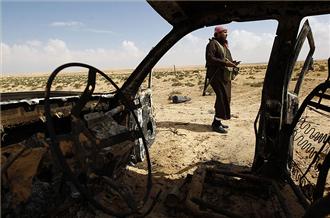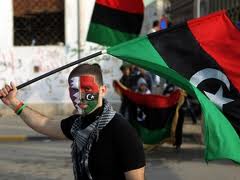Rebels retreat, regroup and hit back with rockets in battle to control key oil town while Gaddafi forces shell Misurata.
Rebel forces fought with troops loyal to Libyan leader Muammar Gaddafi for the third straight day in and around the key oil town of Brega on Sunday, as foreign air strikes continued to rain down on the government's soldiers.
Hundreds of rebels retreated east of Brega under artillery fire earlier in the day before regrouping and firing back with their own rockets. Black smoke rose from the west side of the town, and some rebels suggested that better-trained fighters, possibly defected army troops, were still battling Gaddafi's soldiers inside.
Rebels had managed to advance to a walled university campus near the town's western edge where fighting has swirled since opposition troops first reached the area one month ago. But despite air strikes on Gaddafi's forces that rebels reported hearing on Saturday night, they seemed unable to move further.
"If you compare where we are today to where we were a few weeks ago, then we are in the exact same position," said Al Jazeera's Hoda Abdel-Hamid, reporting from Ajdabiya.
The rebels seem able to advance only when Gaddafi's forces pull out, she said, though the opposition claims it is still trying to bring order to its nascent army.
Meanwhile, Abdelati Labidi, a Libyan deputy foreign minister, left the country on Sunday morning, entering Tunisia through the main border crossing at Ras Ajdir. It remains unclear whether or not he was travelling in an official capacity, but the Tunisian state news agency said he was on a "private visit".MISURATA ENDURES MORE SHELLING
In the west, Gaddafi's troops continued to attack Misurata, Libya's third-largest city and the last major rebel hold-out in the region. A mortar attack in the city killed at least one person and wounded several others early on Sunday morning.
Two mortar shells hit a building that had previously been used to treat the wounded, though patients and medical staff had already left days ago.
Ambulances carried the wounded to a new building being used as a makeshift hospital, a witness told the Reuters news agency after the shelling.
A man named Ayman who said he was a doctor in Misurata told BBC Radio that the new clinic was overwhelmed.
"We have one killed, three in the operating room now, one with an amputated leg, we have one in ICU [intensive care unit] because of shell fragments in his chest and we have six wounded with different wounds and they are waiting for an operation but we have only three operating rooms," he said.
Doctors say more than 240 people have been killed and over 1,000 wounded in Misurata in the last month alone, as a counter-offensive by Gaddafi's troops raised the number of casualties.
The city of Az Zintan also came under fire from Gaddafi's tanks on Sunday, a resident told the Reuters news agency. In Yagran, a nearby mountain town, residents say Gaddafi's forces have surrounded the town and are arresting people.
US SCALES DOWN MILITARY EFFORT
The stalled rebel advance in the east has managed to survive through the intervention of an international military coalition assembled to enforce a UN Security Council resolution, passed in March, that's aimed at protecting Libyan civilians.
After hundreds of air strikes and Tomahawk cruise missile attacks, the coalition managed to halt Gaddafi's advance in the west.
But the group will now have to do without key military support, as Sunday marked a deadline for US forces to begin their anticipated withdrawal from the battlefield.
American administration officials had said they intended all along to take a back seat in the coalition efforts, and US aircraft as of Sunday will not strike targets in Libya unless requested by NATO and approved in Washington DC.
Naval vessels that carried US aircraft and fired Tomahawk cruise missiles in the initial assault are also withdrawing, though some will remain on standby in case NATO needs them.
Despite the withdrawal from the air, some accounts describe a growing US presence on the ground. In the east, which is largely free from the regime's control, media reports have said that American and British clandestine intelligence officers are meeting and training rebel fighters.
REBELS APOLOGIZE FOR PROVOKING AIR STRIKE
On Sunday, the rebels also admitted that a NATO air strike near Brega that killed at least 13 opposition fighters on Friday had been caused by a rebel firing an anti-aircraft gun into the sky during a NATO sortie in the area. The man had apparently been firing to celebrate the advance of opposition forces into Brega, and a rebel spokesman apologised for the incident.
"The leadership is working on preventing a re-occurrence," spokesman Abdulhafiz Ghoga said.
"It was a mistake" said Issa Khamis, a liaison officer for the rebels' transitional government in the town of Ajdabiya, east of Brega. "The aircraft thought they were coming under attack and fired on the convoy."
A spokeswoman for NATO, which leads the international coalition enforcing the no-fly zone over Libya and protecting civilians from attack, said it was checking details of the incident.
"We are looking into these reports. We are always concerned by reports of civilian casualties.
NATO's mission is to protect civilians and civilian areas from the threat of attack," said Oana Lungescu, adding that no formal investigation has been launched.
Speaking to Al Jazeera earlier, Mustafa Gheriani, a Transitional National Council spokesman, said the opposition government understands that "collateral damage may also take place and we do accept it, because we look at the big picture which saving more lives... So a few people being victims of circumstances or of being at the wrong time or the wrong place it is more or less very bad luck."
